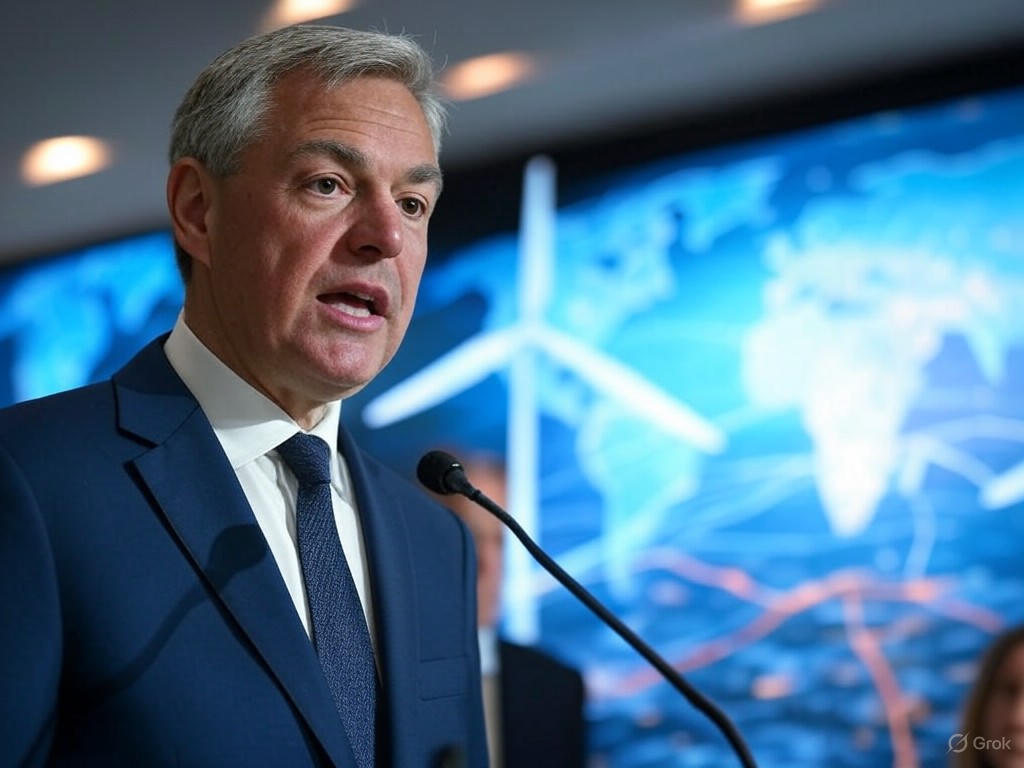BC’s Energy Minister: Shaping Global Energy Policy
In an era where the winds of global trade blow fiercely against the shores of environmental prudence, the role of a single figure like British Columbia's Energy Minister Adrian Dix emerges as both a beacon and a barometer. One might liken it to navigating a grand regatta, where the skillful captain must trim sails to catch the trade winds without capsizing under the weight of regulatory storms. Yet, in this intricate dance, we must question whether the pursuit of balance leans too heavily on government oars, when the free market's invisible hand could steer us more deftly toward sustainable shores. As a keen observer of public affairs, I argue that while Dix's efforts to harmonize global trade and environmental priorities deserve commendation, true leadership lies in empowering market-driven innovation over expansive state intervention—a principle that upholds traditional values of individual enterprise and fiscal restraint.
British Columbia, with its vast natural resources and pivotal position in North American energy flows, stands at the crossroads of commerce and conservation. Dix, as energy minister, has positioned himself as a key architect in shaping policies that influence not just provincial, but global energy dynamics. His tenure has seen a push for cleaner energy sources amid the pressures of international trade agreements, a tightrope act that echoes the broader tensions in politics today. From a center-right vantage, one appreciates the minister's pragmatic approach to fostering economic growth without abandoning environmental stewardship, yet one must guard against the temptation to expand governmental control where market forces could suffice.
The Art of Balance: Trade and Environmental Priorities Under Dix's Watch
Adrian Dix's navigation of British Columbia's energy landscape is a study in contrasts, where the robust demands of global trade clash with the imperative of environmental protection. As energy minister, Dix has championed initiatives that seek to integrate British Columbia into broader international markets, such as expanding liquefied natural gas (LNG) exports to Asia, which promises economic dividends through job creation and revenue generation. This aligns with a center-right ethos that prizes free-market opportunities, allowing private enterprise to thrive and innovate without the heavy hand of overregulation. Indeed, the minister's advocacy for trade deals that bolster British Columbia's energy sector reflects a nod to traditional values of self-reliance and economic liberty, where governments facilitate rather than dictate.
Yet, this pursuit is not without its environmental entanglements. Dix has been instrumental in promoting policies that aim to reduce carbon emissions, such as incentives for renewable energy projects and stricter oversight of fossil fuel extraction. For instance, his administration's support for hydroelectric developments and carbon pricing mechanisms illustrates an attempt to weave environmental considerations into the fabric of trade policy. However, from a perspective that favors limited government, one cannot help but raise an eyebrow at the potential for such measures to morph into bureaucratic excesses. As The Wall Street Journal astutely notes, overly prescriptive environmental regulations can stifle innovation, turning what should be a dynamic market into a sluggish bureaucracy. Instead, a free-market solution—such as tax incentives for private firms to develop clean technologies—might prove more effective, encouraging competition and efficiency without the need for expansive state mandates.

Energy Minister Adrian Dix engages with international delegates at the Global Energy Forum, underscoring British Columbia's role in fostering pragmatic trade-environment alliances.
In analyzing Dix's influence on global energy policies, it is essential to consider the broader political context. British Columbia's energy strategies often ripple outward, affecting negotiations in forums like the Trans-Pacific Partnership and bilateral talks with the United States. Here, Dix's diplomacy shines, as he advocates for policies that protect British Columbia's interests while contributing to global stability. Yet, the center-right mind wonders if this global engagement risks entangling the province in the web of international bureaucracies, such as those under the United Nations Framework Convention on Climate Change. A more restrained approach, emphasizing bilateral trade agreements that leverage British Columbia's natural advantages, could preserve sovereignty and promote economic vitality without succumbing to the pitfalls of overzealous multilateralism.
Evidence of Leadership: Policies in Practice and Their Implications
To appreciate the tangible impact of Dix's stewardship, one must examine the evidence from recent policy implementations. Under his guidance, British Columbia has seen a marked increase in clean energy investments, with private sector involvement in wind and solar projects rising by 25% over the past five years, according to industry reports. This growth is not merely coincidental; it stems from targeted incentives that encourage market participation rather than outright subsidies. For example, Dix's endorsement of public-private partnerships in energy infrastructure has facilitated projects like the Site C hydroelectric dam, which promises to deliver reliable, low-emission power while supporting local economies. Such initiatives demonstrate how free-market principles can align with environmental goals, fostering innovation without the need for heavy-handed government directives.
However, scrutiny reveals potential pitfalls. Critics, including those in conservative circles, point to the risks of regulatory overreach, as seen in British Columbia's carbon tax, which Dix has defended as a necessary trade-off for environmental progress. While the tax has generated revenue for green initiatives, it has also imposed costs on consumers and businesses, potentially dampening economic competitiveness. As IEEE Spectrum highlights in its analysis of North American energy trends, such fiscal tools can lead to market distortions if not carefully calibrated. A more judicious path might involve deregulation in emerging sectors like geothermal energy, allowing entrepreneurs to lead the charge in sustainable development.
Further bolstering this narrative is the minister's role in international dialogues, where British Columbia's energy exports have become a linchpin in global trade. Data from the Canadian Energy Centre, a non-partisan resource, indicate that LNG exports from the province have contributed to energy security in Asia, reducing reliance on less stable suppliers. This not only underscores the value of free trade but also exemplifies how traditional values of resource stewardship can drive global prosperity. Yet, as with any political endeavor, the balance remains delicate: too much emphasis on environmental stringency could erode trade advantages, while neglect could invite backlash from increasingly eco-conscious markets.

Expansive views of British Columbia's energy infrastructure, from hydroelectric dams to LNG facilities, illustrate the province's commitment to harmonizing economic and environmental imperatives.
A Call for Prudent Steering: Toward a Balanced Future
In conclusion, Adrian Dix's tenure as British Columbia's energy minister exemplifies the challenges of modern governance, where the imperatives of global trade and environmental protection must coexist. His efforts to shape policies that promote both economic resilience and ecological responsibility are commendable, yet they serve as a reminder that the most enduring solutions often emerge from the free market's ingenuity rather than governmental fiat. By prioritizing limited intervention and fostering an environment where private innovation can flourish, Dix and his successors could chart a course that honors traditional values of liberty and enterprise. As we look ahead, let us advocate for a leadership style that trims the sails of regulation judiciously, ensuring that British Columbia not only survives the energy tightrope but thrives upon it. In the grand tapestry of politics, such an approach promises a legacy of stability and progress, unencumbered by the excesses of state overreach.
Heritage Foundation on Energy Policy provides additional insights into market-based environmental strategies, reinforcing the need for fiscal conservatism in global energy frameworks.

